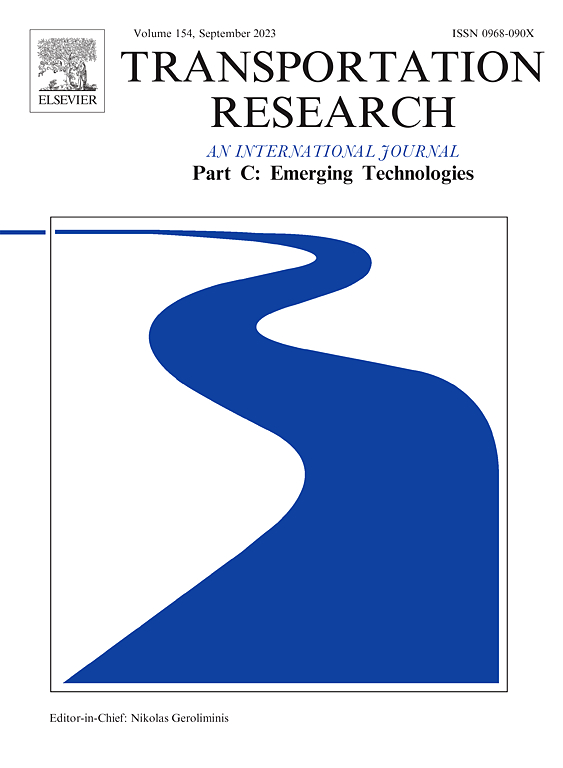具有时间窗和包裹寄存柜的城市最后一英里快递服务:模型制定和分支价格算法
IF 7.6
1区 工程技术
Q1 TRANSPORTATION SCIENCE & TECHNOLOGY
Transportation Research Part C-Emerging Technologies
Pub Date : 2025-08-10
DOI:10.1016/j.trc.2025.105280
引用次数: 0
摘要
包裹储物柜有助于缩短配送时间和成本,为物流公司提供解决方案,以应对最后一英里配送服务的挑战。在本文中,我们提出了一个包含补偿导向奖励策略的包裹寄存器路由问题。该问题假设物流公司可以通过奖励激励来影响客户的偏好,从而获得灵活的配送解决方案。为了表述这个问题,我们提出了一个混合整数线性规划模型,然后是一个集合划分模型。为了解决后一种模型,我们开发了一种分支价格算法,其子问题是具有资源约束的初等最短路径问题的变体。这个子问题需要对节点的选择、分配和排序做出决策。我们还提出了一种定制的双向标记算法,该算法具有新的标签扩展和优势规则来解决子问题。最后,我们从基准实例中生成了两种类型的实例,并在这些实例的基础上进行了大量的实验来评估BP算法的性能。本文章由计算机程序翻译,如有差异,请以英文原文为准。
Urban last-mile delivery services with time windows and parcel lockers: Model formulation and branch-and-price algorithm
Parcel lockers contribute to reducing delivery time and costs, providing logistics companies with solutions to address the challenges of last-mile delivery services. In this paper, we propose a routing problem with parcel lockers that incorporates a compensation-oriented reward strategy. The problem assumes that logistics companies can influence customer preferences through reward incentives, thereby obtaining flexible delivery solutions. To formulate this problem, we proposed a mixed-integer linear programming model, followed by a set-partitioning model. To solve the latter model, we developed a branch-and-price algorithm, whose subproblem is a variant of the elementary shortest path problem with resource constraints. This subproblem requires making decisions about node selection, allocation, and sequencing. We also presented a tailored bidirectional labeling algorithm with new label extension and dominance rules to solve the subproblem. Finally, we generated two types of instances derived from benchmark instances and conducted extensive experiments based on the instances to evaluate the performance of the BP algorithm.
求助全文
通过发布文献求助,成功后即可免费获取论文全文。
去求助
来源期刊
CiteScore
15.80
自引率
12.00%
发文量
332
审稿时长
64 days
期刊介绍:
Transportation Research: Part C (TR_C) is dedicated to showcasing high-quality, scholarly research that delves into the development, applications, and implications of transportation systems and emerging technologies. Our focus lies not solely on individual technologies, but rather on their broader implications for the planning, design, operation, control, maintenance, and rehabilitation of transportation systems, services, and components. In essence, the intellectual core of the journal revolves around the transportation aspect rather than the technology itself. We actively encourage the integration of quantitative methods from diverse fields such as operations research, control systems, complex networks, computer science, and artificial intelligence. Join us in exploring the intersection of transportation systems and emerging technologies to drive innovation and progress in the field.

 求助内容:
求助内容: 应助结果提醒方式:
应助结果提醒方式:


